口译与听力1701
- 格式:doc
- 大小:29.00 KB
- 文档页数:4

上海市英语口译资格证书第一阶段考试中级口译真题听力原文(2002年9月-2006年3月)昂立口译目录2002年9月 ........................................................................................................... 错误!未定义书签。
真题 ................................................................................................................. 错误!未定义书签。
SECTION 1: LISTENING TEST .................................................................. 错误!未定义书签。
Part A: Spot Dictation ..............................................................................................错误!未定义书签。
Part B: Listening Comprehension .............................................................................错误!未定义书签。
1. Statements ........................................................................................................错误!未定义书签。
2. Talks and Conversations ..................................................................................错误!未定义书签。
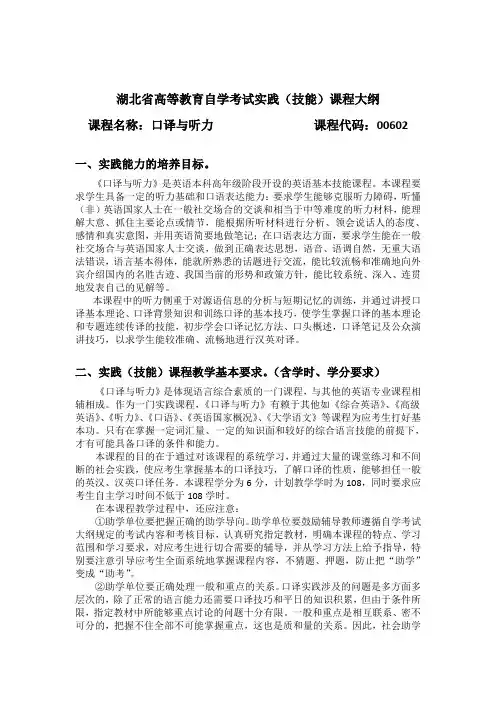
湖北省高等教育自学考试实践(技能)课程大纲课程名称:口译与听力课程代码:00602一、实践能力的培养目标。
《口译与听力》是英语本科高年级阶段开设的英语基本技能课程。
本课程要求学生具备一定的听力基础和口语表达能力:要求学生能够克服听力障碍,听懂(非)英语国家人士在一般社交场合的交谈和相当于中等难度的听力材料,能理解大意、抓住主要论点或情节,能根据所听材料进行分析、领会说话人的态度、感情和真实意图,并用英语简要地做笔记;在口语表达方面,要求学生能在一般社交场合与英语国家人士交谈,做到正确表达思想,语音、语调自然,无重大语法错误,语言基本得体,能就所熟悉的话题进行交流,能比较流畅和准确地向外宾介绍国内的名胜古迹、我国当前的形势和政策方针,能比较系统、深入、连贯地发表自己的见解等。
本课程中的听力侧重于对源语信息的分析与短期记忆的训练,并通过讲授口译基本理论、口译背景知识和训练口译的基本技巧,使学生掌握口译的基本理论和专题连续传译的技能,初步学会口译记忆方法、口头概述,口译笔记及公众演讲技巧,以求学生能较准确、流畅地进行汉英对译。
二、实践(技能)课程教学基本要求。
(含学时、学分要求)《口译与听力》是体现语言综合素质的一门课程,与其他的英语专业课程相辅相成。
作为一门实践课程,《口译与听力》有赖于其他如《综合英语》、《高级英语》、《听力》、《口语》、《英语国家概况》、《大学语文》等课程为应考生打好基本功。
只有在掌握一定词汇量、一定的知识面和较好的综合语言技能的前提下,才有可能具备口译的条件和能力。
本课程的目的在于通过对该课程的系统学习,并通过大量的课堂练习和不间断的社会实践,使应考生掌握基本的口译技巧,了解口译的性质,能够担任一般的英汉、汉英口译任务。
本课程学分为6分,计划教学学时为108,同时要求应考生自主学习时间不低于108学时。
在本课程教学过程中,还应注意:①助学单位要把握正确的助学导向。
助学单位要鼓励辅导教师遵循自学考试大纲规定的考试内容和考核目标,认真研究指定教材,明确本课程的特点、学习范围和学习要求,对应考生进行切合需要的辅导,并从学习方法上给予指导,特别要注意引导应考生全面系统地掌握课程内容,不猜题、押题,防止把“助学”变成“助考”。
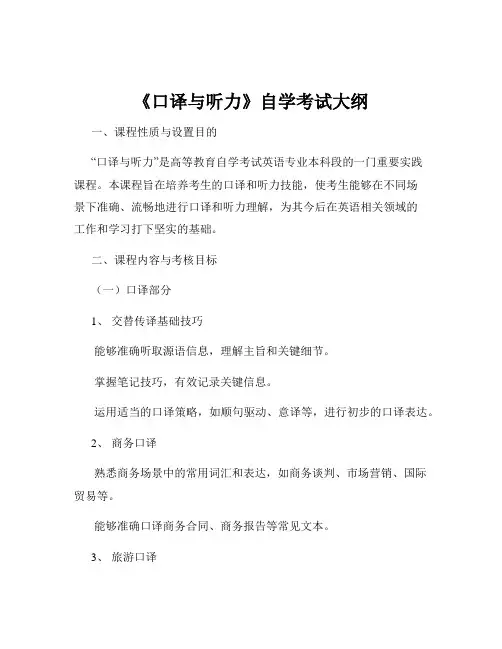
《口译与听力》自学考试大纲一、课程性质与设置目的“口译与听力”是高等教育自学考试英语专业本科段的一门重要实践课程。
本课程旨在培养考生的口译和听力技能,使考生能够在不同场景下准确、流畅地进行口译和听力理解,为其今后在英语相关领域的工作和学习打下坚实的基础。
二、课程内容与考核目标(一)口译部分1、交替传译基础技巧能够准确听取源语信息,理解主旨和关键细节。
掌握笔记技巧,有效记录关键信息。
运用适当的口译策略,如顺句驱动、意译等,进行初步的口译表达。
2、商务口译熟悉商务场景中的常用词汇和表达,如商务谈判、市场营销、国际贸易等。
能够准确口译商务合同、商务报告等常见文本。
3、旅游口译了解旅游相关的背景知识和文化特色。
能够流利地口译旅游景点介绍、旅游服务咨询等内容。
4、会议口译掌握会议口译的规范和礼仪。
能够应对不同主题的会议发言,进行准确、流畅的口译。
(二)听力部分1、基础听力技能能够辨别不同的语音、语调、语速。
理解日常生活、学习和工作中的常见话题。
2、新闻听力熟悉新闻报道的结构和常用词汇。
能够抓取新闻要点,理解新闻主旨。
3、学术讲座听力掌握学术领域的常用词汇和表达方式。
能够理解学术讲座的逻辑结构和主要观点。
三、考试形式与要求(一)考试形式1、口译考试采用现场口译的方式,考生在规定时间内对给定的材料进行口译。
2、听力考试采用闭卷笔试的形式,包括听力理解、听力填空、听力简答等题型。
(二)考试要求1、口译部分要求考生发音清晰、表达流畅、翻译准确,能够灵活应对各种口译场景和话题。
2、听力部分要求考生在规定时间内完成答题,准确理解听力材料的内容,并按照要求进行作答。
四、学习方法与建议(一)口译学习1、多听多练,提高听力水平,为口译打下基础。
2、积累丰富的词汇和表达,尤其是与不同领域相关的专业词汇。
3、进行模拟口译练习,可通过观看相关视频、听取音频材料等方式,并对照参考译文进行自我评估和改进。
(二)听力学习1、每天保持一定的听力练习时间,逐渐适应不同的听力材料和语速。
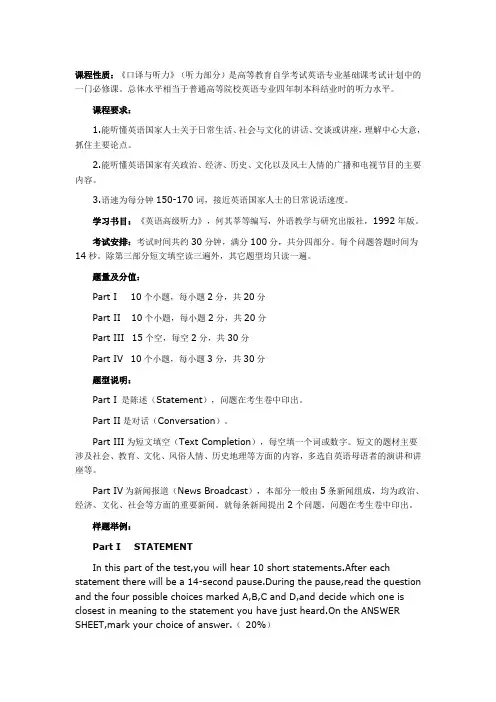
课程性质:《口译与听力》(听力部分)是高等教育自学考试英语专业基础课考试计划中的一门必修课。
总体水平相当于普通高等院校英语专业四年制本科结业时的听力水平。
课程要求:1.能听懂英语国家人士关于日常生活、社会与文化的讲话、交谈或讲座,理解中心大意,抓住主要论点。
2.能听懂英语国家有关政治、经济、历史、文化以及风土人情的广播和电视节目的主要内容。
3.语速为每分钟150-170词,接近英语国家人士的日常说话速度。
学习书目:《英语高级听力》,何其莘等编写,外语教学与研究出版社,1992年版。
考试安排:考试时间共约30分钟,满分100分,共分四部分。
每个问题答题时间为14秒。
除第三部分短文填空读三遍外,其它题型均只读一遍。
题量及分值:Part I 10个小题,每小题2分,共20分Part II 10个小题,每小题2分,共20分Part III 15个空,每空2分,共30分Part IV 10个小题,每小题3分,共30分题型说明:Part I 是陈述(Statement),问题在考生卷中印出。
Part II是对话(Conversation)。
Part III为短文填空(Text Completion),每空填一个词或数字。
短文的题材主要涉及社会、教育、文化、风俗人情、历史地理等方面的内容,多选自英语母语者的演讲和讲座等。
Part IV为新闻报道(News Broadcast),本部分一般由5条新闻组成,均为政治、经济、文化、社会等方面的重要新闻。
就每条新闻提出2个问题,问题在考生卷中印出。
样题举例:Part I STATEMENTIn this part of the test,you will hear 10 short statements.After each statement there will be a 14-second pause.During the pause,read the question and the four possible choices marked A,B,C and D,and decide which one is closest in meaning to the statement you have just heard.On the ANSWER SHEET,mark your choice of answer.(20%)1.听力原文To apply for your VISA you need to go to Room 201 first to confirm your identity.Q:Where are you most likely to hear this statement?考生卷Q:Where are you most likely to hear this statement?A.In a police station.B.In a tourist information centre.C.In a foreign embassy.D.In a bank.2.听力原文I have found another problem with my washing machine,as if one is not enough.Q:What is the speaker trying to say?考生卷Q:What is the speaker trying to say?A.The speaker is not sure about the number of the problems.B.The speaker is complaining about the quality of the washing machine.C.The speaker is trying to find more problems.D.The speaker is ready to buy another washing machine.3.听力原文Cathy's dresses are anything but expensive though she has a substantial bank account.Q:What can we infer about Cathy?考生卷Q:What can we infer about Cathy?A.She sets up a special account to buy expensive dresses.B.She spends a lot on her dresses.C.She puts every penny she saves to her bank account.D.She doesn't spend much on her dresses.Part II CONVERSATIONIn this part of the test,you will hear 10 short conversations between two speakers.At the end of each conversation,a third voice will ask a question about what was said.After the question there will be a 14-second pause.During the pause,read the four possible choices and decide which one would be the best answer to the question you have just heard.On the ANSWER SHEET,find the number of the question and mark your choice of answer.(20%)1.听力原文W:During the last thunderstorm I noticed several leaks in my bedroom ceiling and they really caused a mess.M:Maybe you have some broken tiles.I have the phone number of a good roofing company that could do a good repair job for you at a reasonable price.Q:What can we conclude from this conversation?考生卷A.The roof of the woman's house needs to be repaired.B.The roof of the man's house has several bad leaks.C.The woman's bathroom was badly damaged.D.The man works for a roofing company.2.听力原文W:If I were you,I wouldn't interrupt the boss while he's in an important meeting.Wait till he gets back to his office.M:I have to. He told me to bring him this letter as soon as it arrived,even if he was in the bathroom.Q:Where is the boss?考生卷A.In his office.B.In a meeting.C.In the bathroom.D.In another room.3.听力原文W:Friday's speaker is supposed to be wonderful.Are you going to attend the seminar on that day?M:Yes.But I haven't been able to get the ticket yet.Since the lecture is open to the public,I imagine that the tickets may have already been sold out.Q:Why is the man afraid he won't be able to attend the seminar?考生卷A.He doesn't think that there will be enough seats for everybody.B.He doesn't think that the speaker will show up.C.He doesn't think that the seminar will be open to the public.D.He doesn't think that there may be any more tickets available.Part III TEXT COMPLETIONIn this part of the test,you are going to hear a passage.Some words or numbers on the printed passage have been taken out.Listen carefully and fill in the blanks on the ANSWER SHEET with the words or numbers you hear.The passage will be read THREE times.(30%)听力原文Let's use paper as an example.The first step is to raise public awareness about the recycling process,to explain the kinds of materials that can be recycled,and provide ways on how to properly dispose of them.Local governments should educate the public on how to properly sort reusable materials from those,like waxed paper,carbon paper,plastic material such as fast food wrappers,that can't be recycled very easily.Then,a system of collecting these sorted materials needs to be established.The public interest might be there,but soon may wane if there isn't a system where they can take these materials to be recycled.Sometimes we become complacent when it comes to recycling,but when you speak in terms of actual facts and figures that everyone can understand,people become more aware of the problem.I remember readingone time that the energy saved from one recycled aluminum can will provide enough power to operate a television for three hours.Give the public information they can grasp,and then you will increase your chances of gaining followers.考生卷Let's use paper as an example.The first step is to _____public awareness about the recycling process,to explain the kinds of_______ that can be recycled,and provide ways on how to properly______ ofthem.Local_______should educate the public on how to properlysort_________materials from those,like waxed paper,carbon paper,plastic material such as fast food wrappers,_______can't be recycled veryeasily.Then,a system of________these sorted materials needs to be established.The public interest_________be there,but soon may wane if there isn't a system________they can take these materials to be recycled.Sometimes we become complacent when_________comes to recycling,but when you speak in terms of actual facts and figures that everyone can understand,peoplebecome_________aware of the problem.I remember reading one time that the energy saved_______one recycled aluminum can will provide enough power to________ a television for three hours.Give the public_________they can grasp,and then you will______your chances of gaining followers.Part IV NEWS BROADCASTIn this part of the test,you will hear 5 news broadcasts from foreign broadcast corporations.You will hear them once only.(30%)Questions 1and 2 are based on the following news.At the end of the news item,you will be given 14 seconds to answer each question.On the ANSWER SHEET,mark your choice of answer.听力原文News Item OnePepsiCo of the US and Unilever of the UK have become the latest foreign entrance in China's competitive bottle tea market.The two companies launched Lipton's iced tea in Guangzhou last week in a fifty-fifty venture.PepsiCo is contributing its bottling facilities and distribution networks to the alliance while Unilever provides the famous tea brand and recipe,company executivesaid.China has a growing bottle tea market estimated to be worth 10 billion Yuan.It has been dominated in recent years by two Taiwanese brands:Master Kong and Uni-president.Three other big brands – Nestle,Guangdong-basedJianlibao and Lipton have just entered the market this year.Swiss company Nestle is working in conjunction with Coca Cola.Q:1.The news item is manly about a joint venture between___________.2.Who will provide the distribution networks in the joint venture?考生卷1.The news item is manly about a joint venture between___________.A.a US company and a UK companyB.a Swiss company and a UK companyC.two Taiwanese companiesD.a mainland company and a US company2.Who will provide the distribution networks in the joint venture?A.Unilever.B.Nestle.C.PepsiCo.D.Coca ColaQuestions 1 and 2are based on the following news.At the end of the news item,you will be given 14 seconds to answer each question.On the ANSWER SHEET,mark your choice of answer.听力原文News Item TwoBritain has announced that it is to cancel about 200 million pounds worth of the debts owed to it by poorer commonwealth countries.The International Development Secretary says the relief was being offered to countries committed to eliminating poverty and pursuing good government.This would include taking action against corruption.At the same time,Common Market Finance Ministers are meeting in Mauritius.Britain is expected to put forward a fresh initiative on reducing the debts of the poorest countries.The Chancellor of Exchequer has indicated that he plans to revive a scheme put forward last year by the International Monetary Fund which has not yet provided any relief.Q:1.Which of the following is NOT a condition for the reduction of debts2.By canceling the debts owed to her,Britain intends to ___a similar scheme proposed by the International Monetary Fund.?考生卷1.Which of the following is NOT a condition for the reduction of debtsmitment to wiping out poverty.mitment to good government.mitment to fighting against corruption.mitment to narrowing the gap between the rich and the poor.2.By canceling the debts owed to her,Britain intends to ___a similar scheme proposed by the International Monetary Fund.?A.reject?B.restart?C.followD.reviewQuestions 1 and 2 are based on the following news.At the end of the news item,you will be given 14 seconds to answer each question.On the ANSWER SHEET,mark your choice of answer.听力原文News Item ThreeIsrael and PLO,after 6 days of intensive negotiations,meet again later today for what they say they hope will be the final initialing of an agreement on extending Palestinian self-rule in the West Bank.The two sides had been optimistic about reaching agreement yesterday.But last minute hitches arose over the timetable for releasing thousands of prisoners and the arrangements for the redeployment of Israeli troops.The BBC Jerusalem correspondent says it appears the two sides have made progress on one of the most difficult issues of all,the future of Hebron,the only town in the West Bank where there is a community of Jewish settlers.Q:1. The 6-day negotiations between the PLO and Israel are mainly about2.What progress has been made in their negotiations?考生卷1. The 6-day negotiations between the PLO and Israel are mainly aboutA.the extension of Palestinian self-rule.B.the establishment of Jewish settlement.C.the arrangement of PLO troops.D.the reconstruction of Hebron.2. What progress has been made in their negotiations?A.Israeli troops can stay on in the West Bank.B.Israel has released thousands of prisoners.C.PLO and Israel have made a final agreementD.Agreement has been reached on the future of Hebron.。

上海市高等教育自学考试英语专业(独立本科段)(C050201)口译与听力(口译部分)(08681)自学考试大纲上海外国语大学自学考试办公室编上海市高等教育自学考试委员会组编2014年版I. 课程性质及其设置的目的和要求(一)本课程的性质与设置的目的“口译与听力(口译部分)”是自学考试本科段的一门实践性考核课程。
本课程是一门语言技能应用性课程,在语音、语调和听说训练的基础上,结合口译技巧训练,培养学生一定的口译能力。
本课程主要培养学生进行不同场合英汉—汉英口译的能力,使学生在进一步提高英语听说能力的同时,掌握基本的口译知识与技能,为今后从事一般口译工作打下扎实的基础。
(二)本课程的基本要求1.听的技能1)能全面理解与日常生活和社会紧密联系、体现时代性和实用性的段落。
2)能逐句理解、听懂说话者的主要意思,能听懂交际场合中各类英语会话和讲话。
要求具有一定的听力理解、短时记忆、笔记以及听译等能力。
2.说的技能要求掌握英语口语表达的基本技能,包括语音语调、措辞与语法、语句的连贯以及表达的流利度。
3.口译技能1)能完成英—汉、汉—英口译互译。
口译材料的题材带有普遍性,紧扣社会、时代与日常生活内容,深度与难度适中。
2)能在听懂和理解原话的基础上译出原话的主要内容。
3)掌握一定的口译技能,包括短时记忆能力、笔记能力、概括主题思想的能力、专有名词及固定表达的快速互译、无笔记口译能力等。
要求掌握英译汉、汉译英的口译基本技能。
口译时应能完整、准确、流利地传达原文的思想与内容,语音语调基本正确。
(三)与相关课程的联系本课程同其他专业英语课程,如“口译与听力(听力部分)”、“高级英语”、“英语翻译”、“英语语法”、“英语词汇学”等一起从不同的角度和层次使考生对英语口译有个比较全面、多维的认识。
II. 课程内容与考核目标Unit 1本单元要求考生主要掌握下列口译、听说基本技能:1. 英语数词一至十,两位数乃至三位数的念法及相对应的翻译。

湖北省高等教育自学考试实践(技能)课程大纲课程名称:口译与听力课程代码:00602一、实践能力的培养目标。
《口译与听力》是英语本科高年级阶段开设的英语基本技能课程。
本课程要求学生具备一定的听力基础和口语表达能力:要求学生能够克服听力障碍,听懂(非)英语国家人士在一般社交场合的交谈和相当于中等难度的听力材料,能理解大意、抓住主要论点或情节,能根据所听材料进行分析、领会说话人的态度、感情和真实意图,并用英语简要地做笔记;在口语表达方面,要求学生能在一般社交场合与英语国家人士交谈,做到正确表达思想,语音、语调自然,无重大语法错误,语言基本得体,能就所熟悉的话题进行交流,能比较流畅和准确地向外宾介绍国内的名胜古迹、我国当前的形势和政策方针,能比较系统、深入、连贯地发表自己的见解等。
本课程中的听力侧重于对源语信息的分析与短期记忆的训练,并通过讲授口译基本理论、口译背景知识和训练口译的基本技巧,使学生掌握口译的基本理论和专题连续传译的技能,初步学会口译记忆方法、口头概述,口译笔记及公众演讲技巧,以求学生能较准确、流畅地进行汉英对译。
二、实践(技能)课程教学基本要求。
(含学时、学分要求)《口译与听力》是体现语言综合素质的一门课程,与其他的英语专业课程相辅相成。
作为一门实践课程,《口译与听力》有赖于其他如《综合英语》、《高级英语》、《听力》、《口语》、《英语国家概况》、《大学语文》等课程为应考生打好基本功。
只有在掌握一定词汇量、一定的知识面和较好的综合语言技能的前提下,才有可能具备口译的条件和能力。
本课程的目的在于通过对该课程的系统学习,并通过大量的课堂练习和不间断的社会实践,使应考生掌握基本的口译技巧,了解口译的性质,能够担任一般的英汉、汉英口译任务。
本课程学分为6分,计划教学学时为108,同时要求应考生自主学习时间不低于108学时。
在本课程教学过程中,还应注意:①助学单位要把握正确的助学导向。
助学单位要鼓励辅导教师遵循自学考试大纲规定的考试内容和考核目标,认真研究指定教材,明确本课程的特点、学习范围和学习要求,对应考生进行切合需要的辅导,并从学习方法上给予指导,特别要注意引导应考生全面系统地掌握课程内容,不猜题、押题,防止把“助学”变成“助考”。
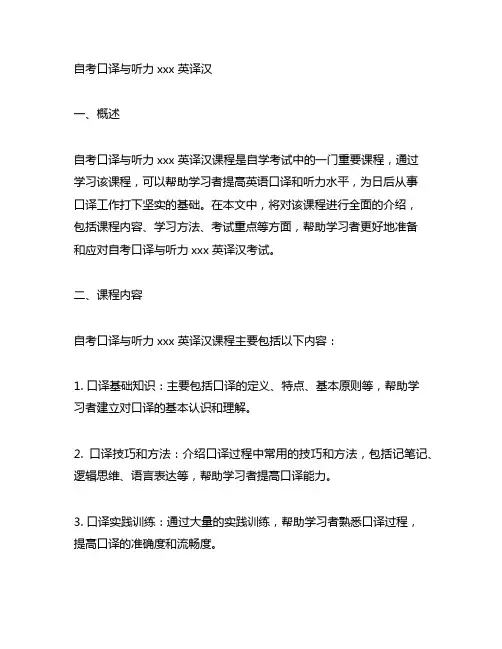
自考口译与听力xxx 英译汉一、概述自考口译与听力xxx 英译汉课程是自学考试中的一门重要课程,通过学习该课程,可以帮助学习者提高英语口译和听力水平,为日后从事口译工作打下坚实的基础。
在本文中,将对该课程进行全面的介绍,包括课程内容、学习方法、考试重点等方面,帮助学习者更好地准备和应对自考口译与听力xxx 英译汉考试。
二、课程内容自考口译与听力xxx 英译汉课程主要包括以下内容:1. 口译基础知识:主要包括口译的定义、特点、基本原则等,帮助学习者建立对口译的基本认识和理解。
2. 口译技巧和方法:介绍口译过程中常用的技巧和方法,包括记笔记、逻辑思维、语言表达等,帮助学习者提高口译能力。
3. 口译实践训练:通过大量的实践训练,帮助学习者熟悉口译过程,提高口译的准确度和流畅度。
4. 听力基础知识:介绍听力的基本原理、方法和技巧,帮助学习者提高听力水平。
5. 听力实践训练:通过大量的听力材料,帮助学习者熟悉不同场景下的听力材料,提高听力的准确度和速度。
以上内容是自考口译与听力xxx 英译汉课程的主要内容,通过系统学习这些内容,学习者可以全面提高自己的口译和听力能力。
三、学习方法针对自考口译与听力xxx 英译汉课程的学习,我们建议学习者采取以下学习方法:1. 注重基础知识的学习:口译和听力的基础知识是学习的基础,学习者应该注重基础知识的学习和理解,扎实基础。
2. 多练习、多模仿:口译和听力需要通过大量的练习和模仿来提高,学习者可以多听多练,模仿优秀的口译和听力者,提高自己的水平。
3. 注重实践和应用:口译和听力需要通过实践来提高,学习者可以参加口译比赛、听力训练班等活动,提高口译和听力的实际能力。
4. 善用工具和资源:学习者可以利用各种口译和听力的工具和资源,如翻译软件、听力材料等,帮助自己更好地学习和提高。
通过以上学习方法的应用,学习者可以更好地学习自考口译与听力xxx 英译汉课程,提高口译和听力能力。

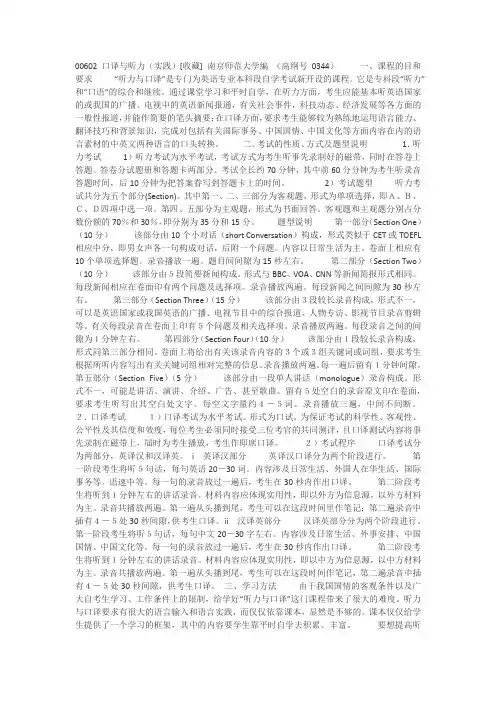
00602 口译与听力(实践)[收藏] 南京师范大学编(高纲号0344)一、课程的目和要求“听力与口译”是专门为英语专业本科段自学考试新开设的课程。
它是专科段“听力”和“口语”的综合和继续。
通过课堂学习和平时自学,在听力方面,考生应能基本听英语国家的或我国的广播、电视中的英语新闻报通,有关社会事件,科技动态、经济发展等各方面的一般性报道,并能作简要的笔头摘要;在口译方面,要求考生能够较为熟练地运用语言能力、翻译技巧和背景知识,完成对包括有关国际事务、中国国情、中国文化等方面内容在内的语言素材的中英文两种语言的口头转换。
二、考试的性质、方式及题型说明1.听力考试1)听力考试为水平考试,考试方式为考生听事先录制好的磁带,同时在答卷上答题。
答卷分试题册和答题卡两部分。
考试全长约70分钟,其中前60分分钟为考生听录音答题时间,后10分钟为把答案眷写到答题卡上的时间。
2)考试题型听力考试共分为五个部分(Section)。
其中第一、二、三部分为客观题,形式为单项选择,即A、B、C、D四项中选一项。
第四、五部分为主观题,形式为书面回答。
客观题和主观题分别占分数份额的70%和30%,即分别为35分和15分。
题型说明第一部分(Section One)(10分)该部分由10个小对话(short Conversation)构成,形式类似于CET或TOEFL 相应中分,即男女声各一句构成对话,后附一个问题。
内容以日常生活为主。
卷面上相应有10个单项选择题。
录音播放一遍。
题目间间隙为15秒左右。
第二部分(Section Two)(10分)该部分由5段简要新闻构成。
形式与BBC、VOA、CNN等新闻简报形式相同。
每段新闻相应在卷面印有两个问题及选择项。
录音播放两遍。
每段新闻之间间隙为30秒左右。
第三部分(Section Three)(15分)该部分由3段较长录音构成,形式不一,可以是英语国家或我国英语的广播、电视节目中的综合报道、人物专访、影视节目录音剪辑等。
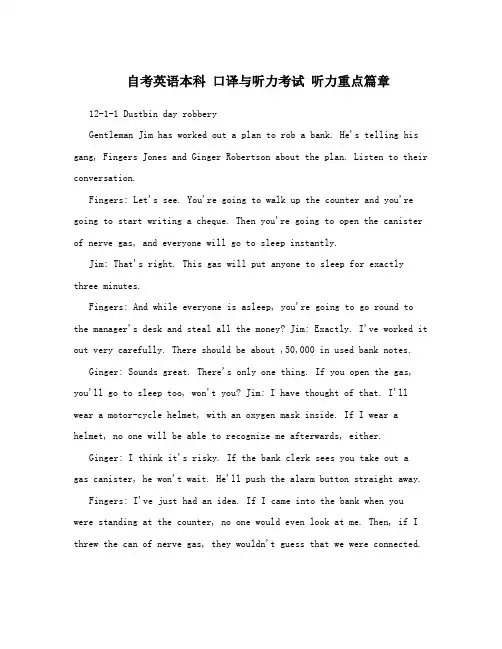
自考英语本科口译与听力考试听力重点篇章12-1-1 Dustbin day robberyGentleman Jim has worked out a plan to rob a bank. He's telling his gang, Fingers Jones and Ginger Robertson about the plan. Listen to their conversation.Fingers: Let's see. You're going to walk up the counter and you're going to start writing a cheque. Then you're going to open the canister of nerve gas, and everyone will go to sleep instantly.Jim: That's right. This gas will put anyone to sleep for exactly three minutes.Fingers: And while everyone is asleep, you're going to go round to the manager's desk and steal all the money? Jim: Exactly. I've worked it out very carefully. There should be about ,50,000 in used bank notes.Ginger: Sounds great. There's only one thing. If you open the gas, you'll go to sleep too, won't you? Jim: I have thought of that. I'll wear a motor-cycle helmet, with an oxygen mask inside. If I wear a helmet, no one will be able to recognize me afterwards, either.Ginger: I think it's risky. If the bank clerk sees you take out agas canister, he won't wait. He'll push the alarm button straight away.Fingers: I've just had an idea. If I came into the bank when you were standing at the counter, no one would even look at me. Then, if I threw the can of nerve gas, they wouldn't guess that we were connected.Ginger: Yes, that might be better. Are you going to wear a helmet, too?Fingers: No. It would look very suspicious if two people were wearing motor cycle helmets. I'll just open the door, throw in the gas canister, and leave Gentleman Jim to rob the bank.Jim: I like that idea. Right, we'll do that. Any other problems that you can see?Ginger: What are you going to do with the money? If you walk out with ,50,000 under your arm, somebody will surelynotice you.Jim: You'll be sitting in a get-away car, waiting for me outsaid the bank.Ginger: But there is a police station just fifty yards away. If I park a car outside the bank, the police would probably come and ask me to move.Fingers: Well, what do you suggest? He can't just walk around the town. He'll be carrying,50,000 in bundles of banknotes.Jim: Just a minute! I've thought of something. What day is this robbery?Fingers: Monday.Jim: Monday! You know what happens on Monday, don't you? It's dustbin day!Ginger: So?Jim: So, can you think of a better way of moving the money? If you saw a man pick up ,50,000 and put it into a car, what would you think?Fingers: I'd think he was a thief.Jim: Exactly. But if you saw a man pick up a dustbin and put it into a lorry, what would you think? Fingers: I'd think he was a dustman. Hey! That's clever!Ginger: And if the ,50,000 was in the dustbin, I could pick up the money and nobody would notice. That's brilliant. Fingers: Is there a dustbin?Jim: Oh yes, several. They put the dustbins out every Monday.They'll be standing there, outside the bank. Fingers: But if you put the money in a dustbin, it'll stink. We'll never be able to spend it if it smells like that. Jim: We don't have to put it in a dustbin. We can put it in a black plastic bag. They often have black plastic bags forrubbishnowadays. If I carry one in my pocket, I can pull it out afteryou've thrown the gas. OK? Let's run through the plan once more.Ginger: You go into the bank with a motor-cycle helmet on, and ablack rubbish bag in your pocket. Fingers: I come in a few minutes later.I open the door, throw in the open gas canister, and then go ... where? Jim: I've hired a room in the building right opposite the bank. Go up in the lift to the top floor and keep a look out. When you get there, radio Ginger, and tell him to come.Ginger: In the meantime, everyone in the bank has gone to sleep, except you. You take the money, and put it in the plastic bag.Jim: I come out, and put the bag with the rubbish, and then go back into the bank.Ginger: Go back?Jim:Oh yes. If everyone woke up and I wasn't there, they'd know I was one of the thieves. No, I'll go back and pretend to wake up with everyone else.Fingers: That's a really clever touch.Ginger: I drive a dustcart and wait in the cul-de-sac behind the bank until Fingers contacts me. Then I come and pick up the rubbish, including the ,50,000.Jim: I can't think of any problems, can you?Task 2: Shop-lifter 12-2-2Man: Excuse me, madam.Woman: Yes?Man: Would you mind letting me take a look in your bag?Woman: I beg your pardon?Man: I'd like to look into your bag, if you don't mind.Woman: Well I'm afraid I certainly do mind, if it's all the same to you. Now go away. Impertinence!Man: I'm afraid I shall have to insist, madam.Woman: And just who are you to insist, may I ask? I advise you to take yourself off, young man, before I call a policeman.Man: I am a policeman, madam. Here's my identity card.Woman: What? Oh ... well ... and just what right does that give youto go around looking into people's bags?Man: None whatsoever, unless I have reason to believe that there's something in the bags belonging to someone else?Woman: What do you mean belonging to someone else?Man: Well, perhaps, things that haven't been paid for?Woman: Are you talking about stolen goods? That's a nice way to talk, I must say. I don't know what things are coming to when perfectly honest citizens get stopped in the street and have their bags examined. A nice state of affairs!Man: Exactly, but if the citizens are honest, they wouldn't mind, would they? So may I look in your bag, madam? We don't want to make a fuss, do we?Woman: Fuss? Who's making a fuss? Stopping people in the street and demanding to see what they've got in their bags. Charming! That's what I call it, charming! Now go away; I've got a train to catch.Man: I'm sorry. I'm trying to do my job as politely as possible butI'm afraid you're making it rather difficult. However, I must insist on seeing what you have in your bag.Woman: And what, precisely, do you expect to find in there? TheCrown Jewels?Man: No need to be sarcastic, Madam. I thought I'd made myself plain. If there's nothing in there which doesn't belong to you, you can gostraight off and catch your train and I'll apologize for the inconvenience.Women: Oh, very well. Anything to help the police.Man: Thank you, madam.Woman: Not at all, only too happy to cooperate. There you are.Man: Thank you,Mm. Six lipsticks?Woman: Yes, nothing unusual in that. I like to change the colourwith my mood.Man: And five powder-compacts?Woman: I use a lot of powder. I don't want to embarrass you, but I sweat a lot. (Laughs)Man: And ten men's watches?Woman: Er, yes. I get very nervous if I don't know the time. Anxiety, you know. We all suffer from it in this day and age.Man: I see you smoke a lot, too, madam. Fifteen cigarette lighters?Woman: Yes, I am rather a heavy smoker. And ... and I use them for finding my way in the dark and ... and for finding the keyhole late at night. And ... and I happen to collect lighters. It's my hobby. I have a superb collection at home.Man: I bet you do, madam. Well, I'm afraid I'm going to have to ask you to come along with me.Woman: How dare you! I don't go out with strange men. And anyway Itold you I have a train to catch.Man: I'm afraid you won't be catching it today, madam. Now are you going to come along quietly or am I going to have to call for help?Woman: But this is outrageous! (Start fade)-2-1 What do you like about your job? 13First speaker: I'm a night person. I love the hours, you know? Ilike going to work at around six at night and then getting home at twoor three in the morning. I like being out around people, you know,talking to them, listening to their problems. Some of my regulars are always on the lookout for ways that they can stump me. Like last week, one of them came in and asked for a Ramos gin fizz. He didn't think I knew how to make it. Hah! But I know how to make every drink in the book, and then some. Although some of the nights when I go in I just don'tfeel like dealing with all the noise. When I get in a big crowd it canbe pretty noisy. People talking, the sound system blaring, the pinball machine, the video games. And then at the end of the night you don't always smell so good, either. You smell like cigarettes. But I like the place and I plan on sticking around for a while.Second speaker: If I had to sit behind a desk all day, I'd go crazy! I'm really glad I have a job where I can keep moving, you know? My favourite part is picking out the music—I use new music for every ten-week session. For my last class I alwaysuse the Beatles—it's a great beat to move to, and everybody loves them. I like to sort of educate people about their bodies, and show them, you know, how to do the exercises and movements safely. Like, it justkills me when I see people trying to do situps with straight legs—it' so bad for your back! And ... let's see ... I—I like to see people make progress—at the end ofa session you can really see how people have slimmed down and sortof built up some muscle—it's very gratifying.The part I don't like is, well, it's hard to keep coming up with new ideas for classes. I mean, you know, there are just so many ways you can move your body, and it's hard to keep coming up with interesting routines and ... and new exercises. And it's hard on my voice—I have to yell all the time so people can hear me above the music, and like after three classes in one day my voice has had it. Then again, having three classes in one day has its compensations—I can eat just about anything I want and not gain any weight!Third speaker: What do I like about my job? Money. M-O-N-E-Y. No, I like the creativity, and I like my studio. All my tools are like toys to me—you know, my watercolours , pen and inks, coloured pencils, drafting table—I love playing withthem. and I have lots of different kinds of clients—I do magazines, book covers, album covers, newspaper articles—sothere's lots of variety, which I like. You know, sometimes when I start working on a project I could be doing it for hours and have no conception of how much time has gone by—what some people call a flow experience. I don't like the pressure,though, and there's plenty of it in this business. You're always working against a tight deadline. And I don't like the business end of it—you know, contacting clients for work, negotiating contracts, which get long and complicated.Fourth speaker: Well, I'll tell you. At first it was fun, because there was so much to learn, and working with figures and money was interesting. But after about two years the thrill was gone, and now it's very routine. I keep the books, do the payroll, pay the taxes, pay the insurance, pay the bills. I hate paying the bills, because there's never enough money to pay them! I also don't like the pressure of having to remember when all the bills and taxes are due. And my job requires a lot of reading that I don't particularly enjoy. I can have to keep up to date on all the latest tax forms, and it's pretty dull. I like it when we're making money, though, because I get to see all of my efforts rewarded.13-2-2 What do you think of yourself?TV Interviewer: In this week's edition of 'Up with People' we went out into the streets and asked a number of people a question they just didn't expect. We asked them to be self-critical ... to ask themselves exactly what they thought they lacked or—the other side of the coin—what virtues they had. Here is what we heard.Jane Smith: Well ... I ... I don't know really ... it's not the sort of question you ask yourself directly. I know I'm good at myjob ... at least my boss calls me hard-working, conscientious, efficient. I'm a secretary by the way. As for when I look at myself in a mirror as it were ... you know ... you sometimes do in the privacy of your own bedroom ... or at your reflection in the ... in the shop windows as you walk up the street ... Well ... then I see someone a bit different. Yes ... I'm different inmy private life. And that's probably my main fault I should say ...I'm not exactly—oh how shall I say? —I suppose I'm, not coherent in my behaviour. My office is always in order...but my flat! Well...you'd have to see it to believe it.Chris Bonner: I think the question is irrelevant. You shouldn't be asking what I think of myself ... but what I think of the state of this country. And this country is in a terrible mess. There's only one hopefor it—the National Front. It's law andorder that we need. I say get rid of these thugs who call themselves Socialist Workers ... get rid of them I say. So don't ask about me. I'm the sort of ordinary decent person who wants to bring law and order back to this country. And if we can't do it by peaceful means then ...Tommy Finch: Think of myself? Well I'm an easy-going bloke really ... unless of course you wind me up. Then I'm a bit vicious. You know. I mean you have to live for yourself don't you. And think of your mates. That's what makes a bloke. I ain't got much sympathy like with themwhat's always thinking of causes ... civil rights and all that. Imean ... this is a freecountry inning? What do we want to fight for civil rights for? We've got them.Charles Dimmak: Well ... I'm retired you know. Used to be an army officer. And ... I think I've kept myself ... yes I've kept myself respectable—that's the word I'd use—respectable and dignified the whole of my life. I've tried to help those whodepended on me. I've done my best. Perhaps you might consider me abit of a fanatic about organization andself-discipline comes first—and all that sort of thing. Butbasically I'm a good chap ... not too polemic ... fond discipline—of my wife and family ... That's me.Arthur Fuller: Well ... when I was young I was very shy. At timesI ... I was very unhappy ... especially when I was sent to boarding-school at seven. I didn't make close friends till ... till quite late in life ... till I was about ... what ... fifteen. Then Ibecame quite good at being by myself. I had no one to rely on ... and no one to ask for advice. That made me independent ... and I've always solved my problems myself. My wife and I have two sons. We ... we didn't want an only child because I felt ... well I felt I'd missed alot of things.15-1-2Task 2:A new way of lifeAnnouncer: On 'TV Magazine' tonight we're looking at people who have given up regular jobs and high salaries to start a new way of life.First of all, we have two interviews with people who decided to leavethe 'rat race'. Nicola Burgess spoke to them.Nicola: This is the Isle of Skye. Behind me you can see the croft belonging to Daniel and Michelle Burns, who gave up their jobs to cometo this remote area of Scotland. Daniel was the sales manager of Hi-Vita, the breakfast cereal company, and Michelle was a successful advertising executive. Michelle, can you tell us what made you give up everything to come here?Michelle: Everything? That's a matter of opinion. A big house andtwo cars isn't everything! Dan and I both used to work long hours. Wehad to leave so early in the morning and we came home so late at night, that we hardly ever saw each other. We should have come here years ago, but we were earning such big salaries that we were afraid to leave our jobs. In the end we had so little time together that our marriage was breaking up. So two years ago, we took a week's holiday in the Scottish Highlands. We saw this place and we both fell in love with it. It wasfor sale, and we liked it so much that we decided to give up our jobs, and here we are!Nicola: How do you earn a living? If you don't mind me asking.Michelle: We don't need very much. We keep sheep and goats, grow our own vegetables. We've got a few chickens. It's a very simple life, and we're not in it for profit. We're still so busy that we work from fivein the morning until eight at night,but we're together. We're happier than we're ever been and we're leading a natural life.Nicola: There must be some things you miss, surely.Michelle: I don't know. We knew such a lot of people in London, but they weren't real friends. We see our neighbours occasionally andthere's such a lot to do on the farm that we don't have time to feel lonely. At least we see each other now.Nicola: The motor-bike I'm sitting on is a very special one. Special because it's been all the way round the world. It belongs to Luke Saunders, who has just returned to England after a three year motor-cycle journey. Luke, what led you to leave your job and make this trip?Luke: I worked in a car factory on the assembly line. All I had todo was put four nuts on the bolts that hold the wheels on. It's done by robots now, and a good thing too! The job was so routine that I didn't have to think at all. I bought this Triumph750 cc bike second-hand, fitted two panniers on the back and justset off for Australia.Nicola: What did you do for money?Luke: I had a bit of money to start with, but of course it didn'tlast long and I had to find work where I could. I've done so picked fruit, washed up, worked as a mechanic. many different things—Nicola: How did people react to you? In India, for example.Luke: Everywhere I went, the people were so friendly that problems seemed to solve themselves. There was such a lot of interest in the bike that it was easy to start a conversation. You know, often you can communicate without really knowing the language.Nicola: Did you ever feel like giving up, turning round and coming home?Luke: Only once, in Bangladesh. I became so ill with food poisoning that I had to go to hospital. But it didn't last long. Nicola: You've had such an exciting time that you'll find it difficult to settle down, won't you?Luke: I'm not going to. Next week I'm off again, but this time I'm going in the opposite direction! See you in about three years' time!15-2-2CheeseCheese is one of those foods that we tend to take for granted as always having been with us, and it's odd to think that someone somewhere must have discovered the process that takes place when micro-organisms get into milk and bring about changes in its physical and biochemical structure.Obviously, we don't know who discovered the process, but it'sthought that it came from South-West Asia about 8,000 years ago.Early cheese was probably rather unpalatable stuff, tasteless and bland in the case of the so-called 'fresh cheeses', which are eaten immediately after the milk has coagulated, and rough tasting and saltyin the case of the 'ripened' cheeses, which are made by adding salt to the soft fresh cheese and allowing other biochemical processes to continue so that a stronger taste and a more solid texture result.The ancient Romans changed all that. They were great pioneers in the art of cheese-making, and the different varieties of cheese theyinvented and the techniques for producing them spread with them to the countries they invaded. This dissemination of new techniques took place between about 60 BC and 300 AD. You can still trace their influence in the English word 'cheese', which comes ultimately from the Latin word'caseus', that's C-A-S-E-U-S.Well, things went on quietly enough after the Roman period with the cheese producers in the different countries getting on with developing their own specialities. It's amazing the variety of flavours you can get from essentially the same process.At this stage in history, people weren't aware in a scientific wayof the role of different micro-organisms and enzymes in producing different types of cheese. But they knew from experience that if youkept your milk or your 'pre-cheese' mixture at a certain temperature orin a certain environment, things would turn out in a certain way. The Roquefort caves in France are an example of a place that was used for centuries for the ripening of a certain sort of cheese, before people knew exactly why they produced the effect they did.In the nineteenth century, with the increasing knowledge aboutmicro-organisms, there came the next great step forward in cheese-making.Once it was known exactly which micro-organisms were involved in the different stages of producing a cheese, and how the presence ofdifferent micro-organisms affected the taste, it was possible to introduce them deliberately, and to industrialize the process.Cheese started being made on a large scale in factories, althoughthe small producer working from his farm dairy continued to exist and still exist today. Cheese-making moved very much into the world of technology and industrial processes, although, because the aim is still to produce something that people like to eat, there's still an important role forhuman judgement. People still go round tasting the young cheese at different stages to see how it's getting on, and may add a bit of this or that to improve the final taste. Whatever the scale of production, there is still room for art alongside the technology.16-1-1 Men and women:BBC interviewer: It's probably true to say that women have been affected more than men by recent changes in the way we actually live. Over a hundred years ago people began to question whether men werereally so much wiser, stronger, altogether more sensible and simply better than women as the laws of the country made out. In the end women got the vote, and very recently—in 1975—the Sex Discrimination Act was passed.But it's doubtful whether legislation has changed the way we women actually think. A lot is heard about the dilemma of women's two roles. How can a woman be a wife and mother and have a full-time job as well?In this new series we are going to try to find out what people are really thinking and feeling about this problem, and how it affects their personal lives. In the studio with me today is Mrs. Marina Spiden, who recently experienced the problem of having too much to do at home. With Mrs. Spiden are her husband Brian, her mother Mrs. Vera Cresswell and Mr. Tom Penman, their local newsagent. Mrs. Spiden ... tell us what happened will you?Mrs. Spiden: Well ... you just said it ... the problem of having too much to do at home. I do an afternoon job so I have to get the housework and shopping ... er ... done in the morning. And one morning you see ... er ... I just couldn't stand it no more.The ... the baby was bawling her head off. Jimmy—that's my littleboy ... he's two—had thrown the radio out of thewindow ...Interviewer: Really!Mrs. Spiden: Yes really ... The dog ... you know ... had made a ...a mess on the carpet. And there was Brian—myhusband—there he was snoring a way on the settee. Didn't lift afinger he didn't ... not a finger to help me. Mr. Spiden: Now nowlove ... Don't get all her up about it again ... I mean that's your side of the story ... Interviewer: Of course Mr. Spiden ... We'd like to hearyour side later. So ... what did you do about it? Mrs. Spiden: Well ... What do you do when you've got something you're fed up with or ... or ... you don't want like ... You put them up for sale don't you? And that's exactly what I did do. Put the whole damn lot of 'em up for sale. Interviewer: The family you mean.Mrs. Spiden: Yes ... the family ... including the dog.Mr. Penman: She came into my shop that very day and 'Tom', she says, 'I've just about had enough of it. I'm sick of slaving for a husbandwhat sleeps all day. So here you are,' she says. And she gives me an advert on a card to put up in the window of the paper shop.Interviewer: What did it say?Mr. Penman: I've got it here.Interviewer: Read it for us will you?Mr. Penman: 'For Sale—One house-trained dog, one reasonably trained boy of two years, one baby girl of two weeks and one man that needs training. Any offers considered. Apply within.'Interviewer: And were there any offers?Mrs Cresswell: It was me what wrote that advert. You see ... I live with Marina and Brian ...Mr Spiden: She and her dog ...Mr. Penman: Oh yes. Caused quite a stir it did. I should say I had inquiries from ... from about a couple of dozen housewives in all.Interviewer: And what offers did they make?Mr. Penman: Well one woman offered 25p. She said that's all a man was worth.Interviewer: What about you Mr. Spiden? What was your reaction to the advertisement?Mr. Spiden: Well ... you can imagine ... My wife told me about it but I thought she was joking. Little did I realize ... I was bloody furious when I saw it there. It wasn't till next morning. We live upstairs of the paper shop and when I come down to go on my milkround ...Interviewer: Yes of course ... you're a milkman ...Mrs. Spiden: That's right. I often have a dekko at the adverts Tom puts up. And when I saw that one sort of ... staring me in the face ...I nearly blew me top.Interviewer: What did you do?Mrs. Cresswell: I'll tell you what he did. He came and blamed me for everything.Mr. Spiden: Well it was you ... wannit ... that egged her on. It was you that wrote the advert.Mr. Penman: It was a big joke really. Just that Brian took it all the wrong way. Know what he did? When he come off his milk round he barges into the shop and he says, 'Take that bloody advert out and put one in for me. Ask some kind taxi-driver or someone to come and take my mother-in-law back to Birmingham.'Mr. Spiden: But it's all blown over now ... innit. It's done us a world of good in a way. We're the best of friends again. Even the dog started to ...17-1-1 Task 1: News in briefHere is a summary of the news.Shots are fired in a south London street by escaping bank robbers.Four rock fans die in a stampede at a concert Chicago.And how an Air France Concorde was involved in the closest recorded miss in aviation history?Shots were fired this morning in the course of an 80 m.p.h. chase along Brixton High Road in London. A police constable was injured by flying glass when a bullet shattered his windscreen as he was pursuing a car containing four men who had earlier raided a branch of Barclays Bank at Stockwell. Police Constable Robert Cranley had been patrolling near the bank when the alarm was given. The raiders made their getaway in a stolen Jaguar which was later found abandoned in Croydon. Officials of the bank later announced that ,16,000 had been stolen.Four people were killed and more than fifty injured when fans rushed to get into a stadium in Chicago yesterday where the British pop group Fantasy were giving a concert. The incident occurred when gates were opened to admit a huge crowd of young people waiting outside the stadium for the sale of unreserved seat tickets. People were knocked over in the rush and trampled underfoot as the crowd surged forward. The concert later went ahead as planned with Fantasy unaware of what had happened. A。
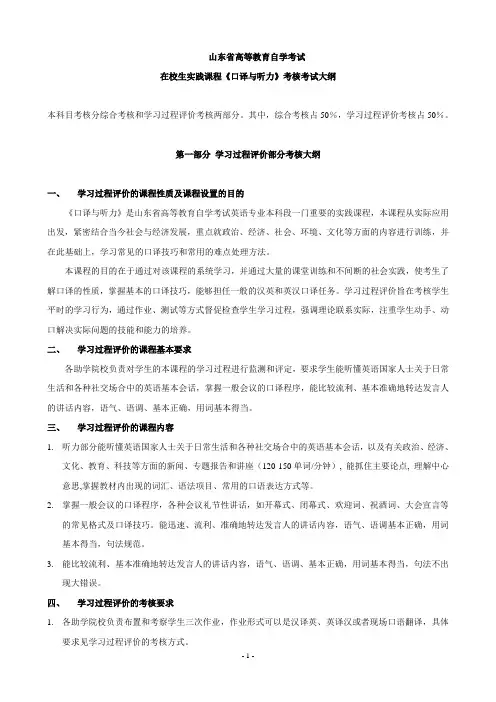
山东省高等教育自学考试在校生实践课程《口译与听力》考核考试大纲本科目考核分综合考核和学习过程评价考核两部分。
其中,综合考核占50%,学习过程评价考核占50%。
第一部分学习过程评价部分考核大纲一、学习过程评价的课程性质及课程设置的目的《口译与听力》是山东省高等教育自学考试英语专业本科段一门重要的实践课程,本课程从实际应用出发,紧密结合当今社会与经济发展,重点就政治、经济、社会、环境、文化等方面的内容进行训练,并在此基础上,学习常见的口译技巧和常用的难点处理方法。
本课程的目的在于通过对该课程的系统学习,并通过大量的课堂训练和不间断的社会实践,使考生了解口译的性质,掌握基本的口译技巧,能够担任一般的汉英和英汉口译任务。
学习过程评价旨在考核学生平时的学习行为,通过作业、测试等方式督促检查学生学习过程,强调理论联系实际,注重学生动手、动口解决实际问题的技能和能力的培养。
二、学习过程评价的课程基本要求各助学院校负责对学生的本课程的学习过程进行监测和评定,要求学生能听懂英语国家人士关于日常生活和各种社交场合中的英语基本会话,掌握一般会议的口译程序,能比较流利、基本准确地转达发言人的讲话内容,语气、语调、基本正确,用词基本得当。
三、学习过程评价的课程内容1.听力部分能听懂英语国家人士关于日常生活和各种社交场合中的英语基本会话,以及有关政治、经济、文化、教育、科技等方面的新闻、专题报告和讲座(120-150单词/分钟), 能抓住主要论点, 理解中心意思,掌握教材内出现的词汇、语法项目、常用的口语表达方式等。
2.掌握一般会议的口译程序,各种会议礼节性讲话,如开幕式、闭幕式、欢迎词、祝酒词、大会宣言等的常见格式及口译技巧。
能迅速、流利、准确地转达发言人的讲话内容,语气、语调基本正确,用词基本得当,句法规范。
3.能比较流利、基本准确地转达发言人的讲话内容,语气、语调、基本正确,用词基本得当,句法不出现大错误。
四、学习过程评价的考核要求1.各助学院校负责布置和考察学生三次作业,作业形式可以是汉译英、英译汉或者现场口语翻译,具体2.各助学院校需组织一次学习过程评价考试,考试题型可参照综合考核部分的题型举例。
中级口译听力篇主讲:杨文杰欢迎使用新东方在线电子教材教程内容提纲1.中级口译概述以及中级口译听力题型分类讲解(题型,评分标准,难点,技巧)2.听力能力提高的4个有效途径3.缩写与Spot Dictation4.听力中的音变现象和美语发音学习5.听力微技巧与Listening Comprehension6.笔记系统与Listening Translation上课必备书籍:《英语中级口译全真试题集》前言:教师介绍与课程风格一、教师介绍与课程介绍(一)、是语音速成班、高级听力预备班、高级口译预备班的结合口语于听力相结合,听力的好坏取决于口语举几个例子,考察一下听力:1、ice or water lose aimsame area your own2、高级口语例子:ill at easecrude oilsleep and eat3、段子:Boys of AmericanA helicopter carrying 8 people was reported missing. After it unloaded a cargo of foods, some crude oil and other provisions for workers digging a major tunnel for a water project for Manila, an official said yesterday.A helicopter carrying eight people was reported老师读两遍,第一遍语速180词/分,第二遍130词/分(中口考试难度)(二)、要听懂各个国家的发音,中级口译分为美式发音和英式发音两种,各占50%问题: Who is presenter; Who is keynote speaker.Good morning, it is a unique honor to act as a whole city, I also understand it is an honor which comes with a great responsibility, and which requires the highest levels of cooperation with the IOC. My promise to you is that we will be your very best partners all of us who made guarantees to you are ready to deliver them now, on security, on finance, on every single undertaking we have given. If you award the game to us, I pledge to you personally, we will continue to give the highest levels of support. My entire government and the main opposition parties, too, are united behind this bid. It has total political support, I can't think of a better place than London to hold an event that unites the world. London will inspire the young people around the world and ensure the Olympic Game will remain the dream for future generation.有关伦敦申奥的短文,以美式和英式发音各读一遍,注意区别。
There are a lot of good cameras available at the moment--most of these are made in Japan but there are also good (S1)_____________models from Germany and the USA. We have (S2)_______________range of different models to see which is the best (S3)___________________money. After a number of different tests and interviews with people who are (S4)_________________assessed, our researchers (S5)______________________with the different cameras being the Olympic BY model as the best auto-focus camera available at the moment. It costs $200 although you may well want to spend more--(S6)_______________much as another $200--on buying (S7)_________________lenses and other equipment. It is a good Japanese camera, easy to use. S8)_________________________________________________________________ whereas the American versions are considerably more expensive The Olympic BY model weighs only 320 grams which is quite a bit less than other cameras of a similar type. Indeed one of the other models we looked at weighed almost twice as much. (S9)__________________________________________________________. ALL the people we interviewed expressed almost total satisfaction with it (Sl0)__________________________________________________The Library of Congress is America’s national library. It has millions of books and other objects. It has newspapers, (S1) ____________publications as well as letters of (S2)______________ interest. It also has maps, photographs, art (S3)__________ , movies, sound recordings and musical (S4)__________ . All together, it has more than 100 million objects.The Library of Congress is open to the public Monday through Saturday, except for public holidays. Anyone may go there and read anything in the collection. But no one is (S5)____________ to take books out of the building.The Library of Congress was (S6)_____________ in 1800. It started with eleven boxes of books in one room of the Capitol Building. By 1814, the collection had increased to about 3,000 books. They were all (S7)__________ that year when the Capitol was burned down during America’s war with Britain.To help re-build the library, Congress bought the books of President Thomas Jefferson. Mr. Jefferson’s collection included 7,000 books in seven languages.(S8)____________________________________________________________________. Today, three buildings hold the library’s collection.(S9)___________________________________________________________________________ __________________________________________ . It buys some of its books and gets others as gifts. It also gets materials through its copyright office. (S10)__________________________________________________________________________ _____________________________.This means the Library of Congress receives almost everything that is published in the United States.It’s difficult to imagine the sea ever running out of fish. It’s so vast, so deep, so (S1) _______. Unfortunately, it’s not bottomless. Over-fishing, (S2) _________ with destructive fishing practices, is killing off the fish and (S3) _________ their environment.Destroy the fish, and you destroy the fishermen’s means of living. At least 60 (S4) _______ of the world’s commercially important fish (S5) _________ are already over-fished, or fished to the limit. As a result, governments have had to close down some areas of sea to commercial fishing.Big, high-tech fleets (S6) _________ that everything in their path is pulled out of water. Anything too small, or the wrong thing, is thrown back either dead or dying. That’s an (S7) _________ of more than 20 million metric tons every year.(S8) I n some parts of the world, for every kilogram of prawns (对虾) caught, up to 15 kilograms of unsuspecting fish and other marine wildlife die, simply for being in the wrong place at the wrong time.True,(9)_____________________________, before every ocean becomes a dead sea.(10) , then catch them in a way that doesn’t kill other innocent sea life.Both language and culture are learned by children without special organized programs of instruction, but motivation to learn is very high since language is the most effective means for a child to obtain what he or she wants. If the learning of a new language begins before lower adolescence, one is likely to be able to speak such a language with complete naturalness, but if learned after upper adolescence some hangover of a mother-tongue feature is very likely to persist. But not only do languages exhibit such learning patterns, but so do cultural traits, for example, shaking hands, kissing, and embracing.Although many persons assume that languages exist in dictionaries and grammars, in fact they only exist in people’s heads. But this is equally true of cultural traits, which indicate clearly a they only exist in people’s heads. But this is equally true of cultural traits, which indicate clearly a person’s value system when crucial decisions need to be made before there is any time to think about alternatives, for example, diving into a flooding stream to rescue a drowning child.。
英语自考口译与听力试题及答案听力部分:一、选择题(每题1分,共10分)1. What does the speaker say about the new policy?A) It will be implemented next month.B) It has been postponed for a year.C) It is still under discussion.2. How many people attended the conference?A) 150B) 200C) 3003. What is the woman's opinion about the new project?A) She is excited about it.B) She is skeptical about its success.C) She has no interest in it.4. What is the man's reason for not attending the lecture?A) He has a prior appointment.B) He is not interested in the topic.C) He is feeling unwell.5. What is the main topic of the lecture?A) Environmental protection.B) Space exploration.C) Economic development.6. When is the deadline for submitting the report?A) Next Friday.B) This coming Monday.C) By the end of this month.7. What does the woman suggest doing about the problem?A) Ignoring it.B) Seeking professional advice.C) Waiting for it to resolve itself.8. How much did the company's profits increase last year?A) By 10%.B) By 20%.C) By 30%.9. What is the man's nationality?A) American.B) British.C) Australian.10. What is the woman's main concern about the new software?A) Its cost.B) Its compatibility.C) Its usability.二、填空题(每题1分,共10分)11. The new marketing strategy will focus on ________ and________.12. The company's revenue for the first quarter was ________ dollars.13. The meeting will be held in ________ at ________.14. The project deadline is ________, which is ________ days away.15. The speaker emphasized the importance of ________ in achieving success.16. The training session will cover ________, ________, and ________.17. The product launch is scheduled for ________ next year.18. The woman reminded everyone to ________ their tickets before leaving.19. The man's presentation was about ________ and its impact on society.20. The company aims to reduce its carbon footprint by________ percent by 2025.口译部分:三、句子口译(每题2分,共10分)21. 我们需要更多的创新来应对未来的挑战。
本人2012年开始自考广外的英语本科,2013年4月首次报名参加实践考核,因为大专是非英语类的,所以要加考口语跟听力这两门,在报名时曾犹豫了一会,最后还是下决心一次报了四门,分别是口译与听力、毕业水平考试、口语(加考)和听力(加考),详细的考试经历及心得我4月考完后就写在了这个帖子里,有兴趣的可以去翻下,链接在此:/modules.php?app=group_sub_show&subject_id=188906&group_id=5&use r_id=&g_type=gov六月初成绩出来了,登录自考管理系统,惊讶的发现四门全过了,口译与听力的成绩是中等,毕业水平考试的成绩是中等,听力(加考)的成绩是中等,口语(加考)的成绩是优秀,立刻与QQ上自考的朋友(多为英语相关类专业)分享了,发现这次考试不少朋友都过了口译与听力这道大难关,当然也有没过的朋友在询问我是怎么准备口译与听力的,加上本人当初在那篇帖子上也承诺过如果通过了,会将自己对该科的心得写出来供各位借鉴,于是抽出点时间来写一篇这样的广外攻略,不足之处,还请批评指正,本人QQ八五零九二七五一。
一.基础篇关于教材:指定的口译上下册的书可以买或者借,网上也有电子版(我传了PDF在网盘),但是个人推荐最好有纸质书;指定的听力教材个人觉得就没必要考了,听力考试中最难的新闻听力都是最新的BBC和VOA新闻,教材里肯定没有,这个完全看平时积累。
关于执行力:什么事情想要达到目标,都离不开执行力,只要你每天真正做到执行了,三个月通过是问题不大的。
个人感觉执行力是这篇攻略的核心。
关于硬件与软件:硬件呢,一个带麦的耳机即可,不用高档货;软件呢,自己去下一个录音软件,或者用Windows 自带的也行,实在不会找就用我上传到网盘里的这个Audio Recorder。
二.听力篇为啥要先说听力?原因很简单,比口译容易拿分,这是个很简单的算术题,听力50分,全选择题,而口译那50分全是主观题,我们的目的就是及格,如果听力能拿到40分,口译只要20分即可,这个方案是相对来说最优的及格路线。
自考口译与听力
自考口译与听力是指在自学考试中的口译与听力科目。
这门科目主要考察考生在口译和听力方面的能力。
**口译部分:**
口译是指将一种语言口头表达的信息准确、流利地转换成另一种语言的过程。
自考口译部分可能包括以下内容:
1. 听力理解:听取并理解给定的英语或其他外语材料,如对话、新闻报道等。
2. 口译技巧:使用合适的翻译技巧和策略,将听到的内容准确地转化为目标语言。
3. 口译实践:进行实际的口译练习,如模拟对话、短文翻译等。
考生需要通过对听力材料的准确理解和口译的准确性来展示自己的口译能力。
**听力部分:**
听力是指对外语听力材料的理解和应用能力。
自考听力部分可能涉及以下内容:
1. 听力理解:听取并理解给定的英语或其他外语材料,如讲座、演讲、对话等。
2. 问题回答:根据所听到的内容,回答相关问题。
3. 笔记记录:根据听到的内容,进行笔记记录。
4. 理解应用:根据所听到的材料,进行信息提取、推理和判断。
考生通过对听力材料的准确理解和问题回答能力来展示自己的听力水平。
为了准备自考口译与听力,建议考生参加相关的口译与听力培训班,使用专业的学习资料和练习题目,并进行大量的实践练习。
此外,注意提高自己的外语听力水平,多进行听力训练和积累词汇量,提高对语言的敏感度和理解能力。
希望以上信息对您有所帮助,祝您顺利通过口译与听力科目!。
1701 Education Lesson One p194 p153
American children start their education in elementary school.
Most youngsters enter first grade at around six years of age.
Children can prepare for this step by attending preschool and kindergarten from ages three to five.
Young learners finish elementary school in fifth or sixth grade.
From there, students go on to junior high school until eighth or ninth grade.
Americans complete their required education in high school.
They graduate and receive a diploma after twelfth grade.
Beyond high school, Americans have many chances for further education.
In contrast to other countries, the U.S. has no national college entrance exam.
Instead, private companies give exams to students.
Universities decide which test students must take.
In addition to test scores, university officials also consider applicant’s high school grades and other activities.
Universities give scholarships and financial aid to help many who cannot afford the high tuition costs.
Students with less academic goals may enroll in vocational school or community colleges.
The American style of education, compared to that of other countries, is quite informal.
In fact, the casual class atmosphere often amazes international students.
American teachers encourage students to think for themselves.
Instead of grading students only on test scores, teachers evaluate papers, group projects and class participation, as well.
Students often have to think creatively to solve problems—not just memorize facts.
Students also learn how to do research by using resource materials to find their own answers.
In this way, classrooms illustrate the American emphasis on individual responsibility.
Freedom of choice is another American value not absent from school life.
In addition to their required courses, high school and college students may choice elective courses.
These electives allow students to study subjects that interest them.
The menu of choices might include typing, band and home economics, as well as special academic classes.
Other activities occupy student s’ time after school hours.
Most schools have sports teams, clubs and publications that give students valuable experience.
The American system of education is far from perfect.
Teachers in America fight to control cheating and plagiarism.
Drugs, violence, sex and peer pressure interfere with students’ education.
Test scores are declining.
In light of these issues, American teachers have an important and challenging job.
They must instill cultural and moral values, as well as knowledge, in young American citizens.。